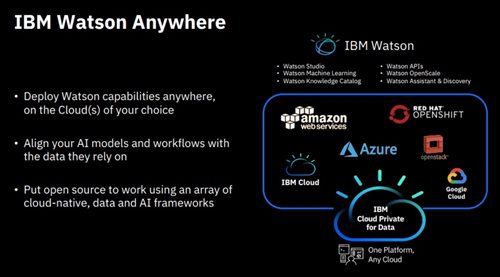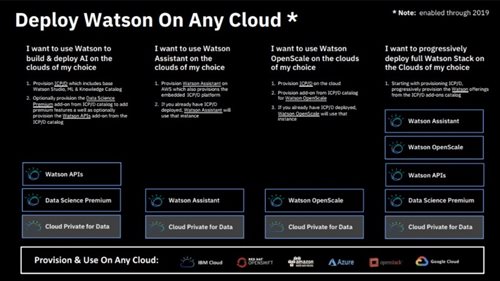Multicloud & AI Everywhere - IBM Think 2019
By Natalie Evans
March 6, 2019
acquisition, AI, AWS, Blockchain, Cloud Computing, data, Hybrid Cloud, IBM, IBM Watson, IoT, multicloud
The 2019 IBM Think Conference has now concluded in San Francisco. Bringing over 30,000 attendees, IBM thought-leaders, innovators, and industry front-runners provided hundreds of sessions sharing their vision on cloud , internet of things (IoT), blockchain, quantum computing, AI, data analytics, and much more.
, internet of things (IoT), blockchain, quantum computing, AI, data analytics, and much more.
While machine learning and AI took center stage at the conference, IBM made some major AI announcements, serving as a reminder of how the company has some of the most competitive services for implementing AI in the market. For IBM to win in the AI race against AWS, Microsoft, and Google Cloud in 2019 and beyond, it must improve its developer strategy and strengthen its communications, especially in areas it leads the market.
According to IBM CEO, President and Chairman Ginni Rometty in her opening address, “chapter two” of digital transformation has arrived. She explained how companies today are entering the next phase of cloud adoption and digital transformation. For Rometty, this next chapter is scalable, driven by artificial intelligence (AI), and embedded across the enterprise. But without information architecture, she noted, “there is no AI.”
Watson Anywhere
Until now, Watson has traditionally been a solution only available through IBM’s Cloud services. At the event, IBM announced it is opening Watson to run on any private, public, hybrid, or multi-cloud solution. In addition, they will be offering an on-premises solution running Watson. IBM is essentially looking to make Watson the most accessible Artificial Intelligence (AI) solution that can execute wherever the data resides, even if it is split between platforms.
IBM has been a leader in AI technology with the development of Watson, an intelligent platform capable of processing a wide range of information and adapting to almost any application. Since its introduction, Watson has been applied to nearly everything from customer service to scientific and business modeling. Watson is recognized as an innovative breakthrough that is paving the direction of applied AI. During the keynote address, several companies discussed how they are already leveraging Watson AI as the foundation of their business solutions.

"Businesses have largely been limited to experimenting with AI in silos due to the limitations caused by cloud provider lock-in of their data," said Rob Thomas, General Manager for IBM Data and AI. "With most large organisations storing data across hybrid cloud environments, they need the freedom and choice to apply AI to their data wherever it is stored. By breaking open that siloed infrastructure we can help businesses accelerate their transformation through AI."

The “Watson Anywhere” strategy will allow customers to run Watson AI services in any environment. "Businesses will be able to infuse AI into their apps, regardless of where they reside. The flexibility this affords can remove one of the major obstacles to scaling AI since businesses can now leave data in secure or preferred environments and take Watson to that data.", said IBM in their press release. Their newly built Watson microservices in Kubernetes containers using OpenShift will enable enterprises to deploy all or parts of the portfolio on the on-premises, private cloud, and public-cloud options. IBM hopes the flexibility of Watson Anywhere, will encourage more enterprises to move beyond experimenting with AI by giving them more opportunities to run AI wherever data resides such as AWS, Alibaba, Google Cloud, or Azure.
Multicloud Management
Rometty also took the opportunity to talk about IBM’s next chapter and introduced the recent $34 billion acquisition of Red Hat. She explained how the acquisition had brought new focus to IBM and its strategy, which is now focused on hybrid, multicloud services.
"IBM will become the world's number one hybrid cloud provider, offering companies the only open cloud solution that will unlock the full value of the cloud for their businesses.", Rometty said at the time of the acquisition, making a clear statement regarding IBM's hybrid-led strategy. Furthermore, she told CNBC last week that hybrid cloud is a "trillion dollar market and we'll be number one.".
In a report by Rightscale, 94% of enterprises are using a combination of public and private cloud environments today, and two-thirds are using more than one public cloud provider. Many enterprises are concerned by the lock-in that is present with cloud providers and are concerned about their ability to move data between clouds, as well as applying connectivity, management, and security among them consistently. Rometty addressed these concerns by discussing how IBM’s strategy of offering a mix-and-match type-set of services formed from its middleware will help customers manage workloads across these environments.
Compared to Amazon Web Service and Microsoft, IBM has fallen behind in its public cloud. In an effort to close the gap, they have announced that they will focus on hybrid and multicloud management as its next best hope for deep differentiation. While IBM has a lot of legacy data and most enterprises on the cloud have more than one provider, the multicloud option is becoming more prominent in the enterprises' information technology strategy.
How IBM will help you go hybrid
IBM mentioned that their focus is on assisting the customer in going hybrid. They have released a whole range of tools and services "to help businesses migrate, integrate, and manage applications and workloads seamlessly and with security across any public or private cloud and on-premises IT environment.".
More specifically, this includes a new IBM Cloud Integration Platform to help operate cloud services across cloud and on-premise environments under a single, secure operating model and toolset. The 'container-based' platform promises easy porting of data and applications across infrastructure and aligns API management, events, and enterprise messaging.
IBM also mentioned, on the services side, they will be aligning much of its sales and consulting teams around advising customers on "how to architect the right holistic cloud strategy from design, migration, integration, road mapping, and architectural services to navigating their journey to cloud.".
IBM has now extended the reach of their Watson platform (Watson Studio, Watson Assistant, Watson OpenScale, etc) on the new IBM Cloud Private for Data (ICP for Data), which can be deployed on IBM Cloud or any private, public, hybrid, or multi-cloud environment through the use of Kubernetes technology. Additionally, IBM announced an extension of Watson Machine Learning with the Watson Machine Learning Accelerator for high-performance GPU clustering.
Ending Notes
IBM has long been a player in the cloud vendor wars but has sat on the sidelines of the 'big three'. With this move, IBM is essentially course correcting, setting itself out to be the hybrid cloud provider. By being as open, and open source as possible, IBM is showing customers that it will be an independent player in the cloud market.
While AWS has dominated the cloud industry, many of its rivals are now looking less to compete, and more to complement Amazon. Even with IBM Watson Everywhere's new value-added features, is it too little too late to regain momentum? It will be interesting to see how this pans out in the future.

Natalie Evans
Natalie Evans has over 16-years in the tech industry and currently works as the event coordinator and tech reporter for CMS-Connected, keeping up-to-date on what's happening in and around the Content Management industry.